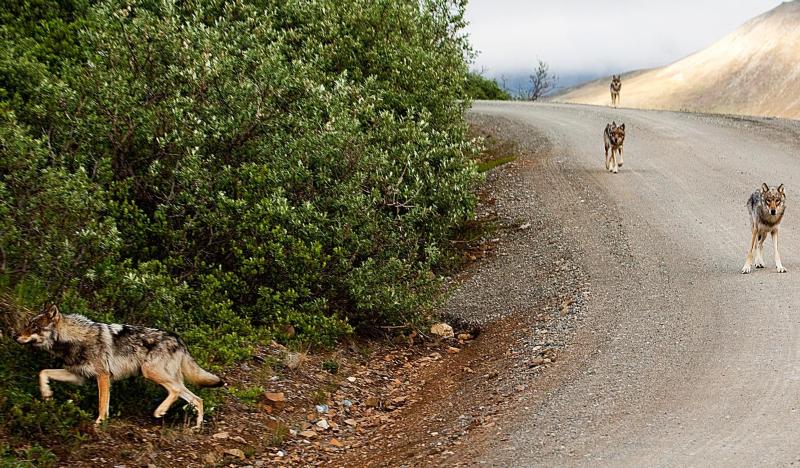
Alaska Governor Mike Dunleavy is shaking up the Department of Fish and Game.
His acting commissioner, Doug Vincent-Lang, has made a pair of unconventional, high-level appointments. Rick Green — the right-wing talk show host known as Rick Rydell — is Vincent-Lang’s new special assistant.
And Eddie Grasser, who earlier this year worked as a lobbyist for a hunters’ advocacy group, Safari Club International, will lead the department’s wildlife conservation division.
The administration of Dunleavy, a Republican, has not released its proposed budget for the department, and it also hasn’t announced any major policy changes.

But Vincent-Lang, who served as a top fish and game official under the previous Republican governor, Sean Parnell, said he won’t shrink from some of the more contentious policies he promoted in his past stint at the department. And that’s likely to shift the complex dynamics between the different entities and interests involved in Alaska’s fish and wildlife politics – from the state and federal governments to tribes, hunting organizations and fishing groups.
Under Parnell, Vincent-Lang fought the federal government on several fronts. One of them was over federal protections for endangered species like humpback whales and Steller sea lions, with the state arguing that such protections unnecessarily restricted activity like fishing and oil and gas development.
“Increasingly, I think we’re seeing an intrusion by the federal government into states’ rights to manage,” Vincent-Lang said in a phone interview Friday. “We’re going to fight hard to protect those — and where we can, cooperate with our federal agencies on research and other things.”
Vincent-Lang was also an advocate for predator control, a controversial state program that kills wolves and bears in an effort to leave more moose and caribou for hunters.
“I’m not going to shy away from doing predation control to increase productivity,” he said. “To the extent that we’re going to manage to ecosystems to maximize the number of moose and caribou coming out there for putting food on Alaskans’ plates, I’m willing to do that.”
Green, the special assistant, will earn $87,000 annually to work with Vincent-Lang on outreach and communication.
Two weeks ago, Green was still broadcasting his drive-time Anchorage talk radio show under the name Rick Rydell.
Rydell once referred to himself as a “flame-throwing conservative” who skewered “wacko” liberals on the radio. But in a Thursday phone interview, he was back to his given name, Rick Green, and sitting at a desk as a state employee.

Green, in a phone interview, described one of his main tasks as “rebuilding trust” with different groups frustrated with the way Alaska’s fish and game have been divided up. He cited dipnetters as one example, saying they were frustrated by the lack of available fish on the Kenai River in the summer.
That echoes one of Dunleavy’s criticisms on the campaign trail of the previous governor, independent Bill Walker, who Dunleavy described as overly sympathetic to commercial fishermen.
Vincent-Lang said that as he started as commissioner, he talked with Bob Penney, a longtime advocate for Kenai River recreational fishermen and a major financial supporter of Dunleavy’s gubernatorial bid.
Vincent-Lang also said he plans to meet with commercial fishermen from the same area in the next week. He hasn’t yet named his department’s new top fisheries managers – Vincent-Lang said that will likely happen in early January.
While those high-level jobs remain unfilled, some conservation-minded Alaskans said they’re worried that the fish and game department under Dunleavy will focus on hunting to the detriment of wildlife viewing and tourism.
“If I were a wolf or a bear in Alaska right now, I would be headed for the Canadian border, ASAP,” said Rick Steiner, an environmental advocate and former marine conservation professor in Anchorage.
Among Steiner’s concerns was the hiring of Grasser as the department official in charge of wildlife conservation.
Grasser grew up in a family of hunting guides, and once rode horses as they swam across the Copper River in the Wrangell Mountains. Later, he became a lobbyist and advocate for sportsmen’s groups like the Alaska Outdoor Council and the National Rifle Association.
In the 1990s, Grasser pushed the fish and game department to cut spending on programs like bear- and bird-viewing. At the time, he was representing the Alaska Outdoor Council, and argued that those non-hunting programs sucked up revenue from taxes on guns, bullets and hunting and fishing licenses.
More recently, Grasser has lobbied for another hunters’ advocacy group, Safari Club International.
Steiner said appointees like Grasser, Green and Vincent-Lang are too narrowly focused on the interests of recreational hunters from Alaska’s more urban regions, and Outside.
“I think the out-of-state trophy hunters and trappers will fare well,” Steiner said. “The major stakeholders that should be very concerned are the commercial fishing industry, the tourism industry and even the subsistence community.”
Steiner’s comments hinted at long-running conflicts over subsistence between rural Alaskans, particularly Alaska Natives, and urban hunters — groups that sometimes vie for the same fish and game.
But a top official at the Alaska Federation of Natives — one of the most powerful advocacy groups that backs subsistence users — said it’s way too early to judge the direction of Dunleavy’s administration.
“We’re looking forward to meeting them and sitting down and talking to them about the pressing issues, and seeing where our common ground is,” said President Julia Kitka.
